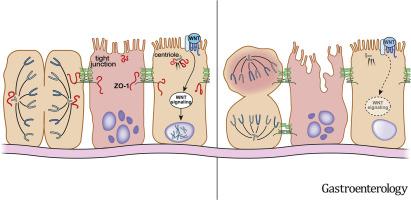Gastroenterology ( IF 25.7 ) Pub Date : 2021-08-31 , DOI: 10.1053/j.gastro.2021.08.047 Wei-Ting Kuo 1 , Li Zuo 2 , Matthew A Odenwald 3 , Shariq Madha 4 , Gurminder Singh 1 , Christine B Gurniak 5 , Clara Abraham 6 , Jerrold R Turner 7

|
Backgrounds & Aims
Increased permeability is implicated in the pathogenesis of intestinal disease. In vitro and in vivo studies have linked down-regulation of the scaffolding protein ZO-1, encoded by the TJP1 gene, to increased tight junction permeability. This has not, however, been tested in vivo. Here, we assessed the contributions of ZO-1 to in vivo epithelial barrier function and mucosal homeostasis.
Methods
Public Gene Expression Omnibus data sets and biopsy specimens from patients with inflammatory bowel disease (IBD) and healthy control individuals were analyzed. Tjp1f/f;vil-CreTg mice with intestinal epithelial–specific ZO-1 knockout (ZO-1KO.IEC) mice and Tjp1f/f mice littermates without Cre expression were studied using chemical and immune-mediated models of disease as well as colonic stem cell cultures.
Results
ZO-1 transcript and protein expression were reduced in biopsy specimens from patients with IBD. Despite mildly increased intestinal permeability, ZO-1KO.IEC mice were healthy and did not develop spontaneous disease. ZO-1KO.IEC mice were, however, hypersensitive to mucosal insults and displayed defective repair. Furthermore, ZO-1–deficient colonic epithelia failed to up-regulate proliferation in response to damage in vivo or Wnt signaling in vitro. ZO-1 was associated with centrioles in interphase cells and mitotic spindle poles during division. In the absence of ZO-1, mitotic spindles failed to correctly orient, resulting in mitotic catastrophe and abortive proliferation. ZO-1 is, therefore, critical for up-regulation of epithelial proliferation and successful completion of mitosis.
Conclusions
ZO-1 makes critical, tight junction–independent contributions to Wnt signaling and mitotic spindle orientation. As a result, ZO-1 is essential for mucosal repair. We speculate that ZO-1 down-regulation may be one cause of ineffective mucosal healing in patients with IBD.
中文翻译:

紧密连接蛋白 ZO-1 对于屏障功能来说是可有可无的,但对于有效的粘膜修复至关重要
背景与目标
通透性增加与肠道疾病的发病机制有关。体外和体内研究表明, TJP1基因编码的支架蛋白 ZO-1 的下调与紧密连接通透性的增加有关。然而,这尚未在体内进行测试。在这里,我们评估了 ZO-1 对体内上皮屏障功能和粘膜稳态的贡献。
方法
对来自炎症性肠病(IBD)患者和健康对照个体的公共基因表达综合数据集和活检标本进行了分析。使用化学和免疫介导的疾病模型研究了肠上皮特异性 ZO-1 敲除 (ZO-1 KO.IEC ) 小鼠的Tjp1 f/f ;vil-Cre Tg小鼠和无 Cre 表达的Tjp1 f/f小鼠同窝小鼠以及结肠干细胞培养物。
结果
IBD 患者的活检标本中 ZO-1 转录物和蛋白表达降低。尽管肠道通透性略有增加,但 ZO-1 KO.IEC小鼠很健康,没有出现自发性疾病。然而,ZO-1 KO.IEC小鼠对粘膜损伤高度敏感,并且表现出修复缺陷。此外,ZO-1缺陷的结肠上皮细胞未能上调增殖以响应体内损伤或体外Wnt信号传导。 ZO-1 与分裂期间细胞的中心粒和有丝分裂纺锤体极相关。在缺乏 ZO-1 的情况下,有丝分裂纺锤体无法正确定向,导致有丝分裂灾难和增殖失败。因此,ZO-1 对于上皮增殖的上调和有丝分裂的成功完成至关重要。
结论
ZO-1 对 Wnt 信号传导和有丝分裂纺锤体方向做出关键的、独立于紧密连接的贡献。因此,ZO-1 对于粘膜修复至关重要。我们推测ZO-1下调可能是IBD患者粘膜愈合无效的原因之一。











































 京公网安备 11010802027423号
京公网安备 11010802027423号